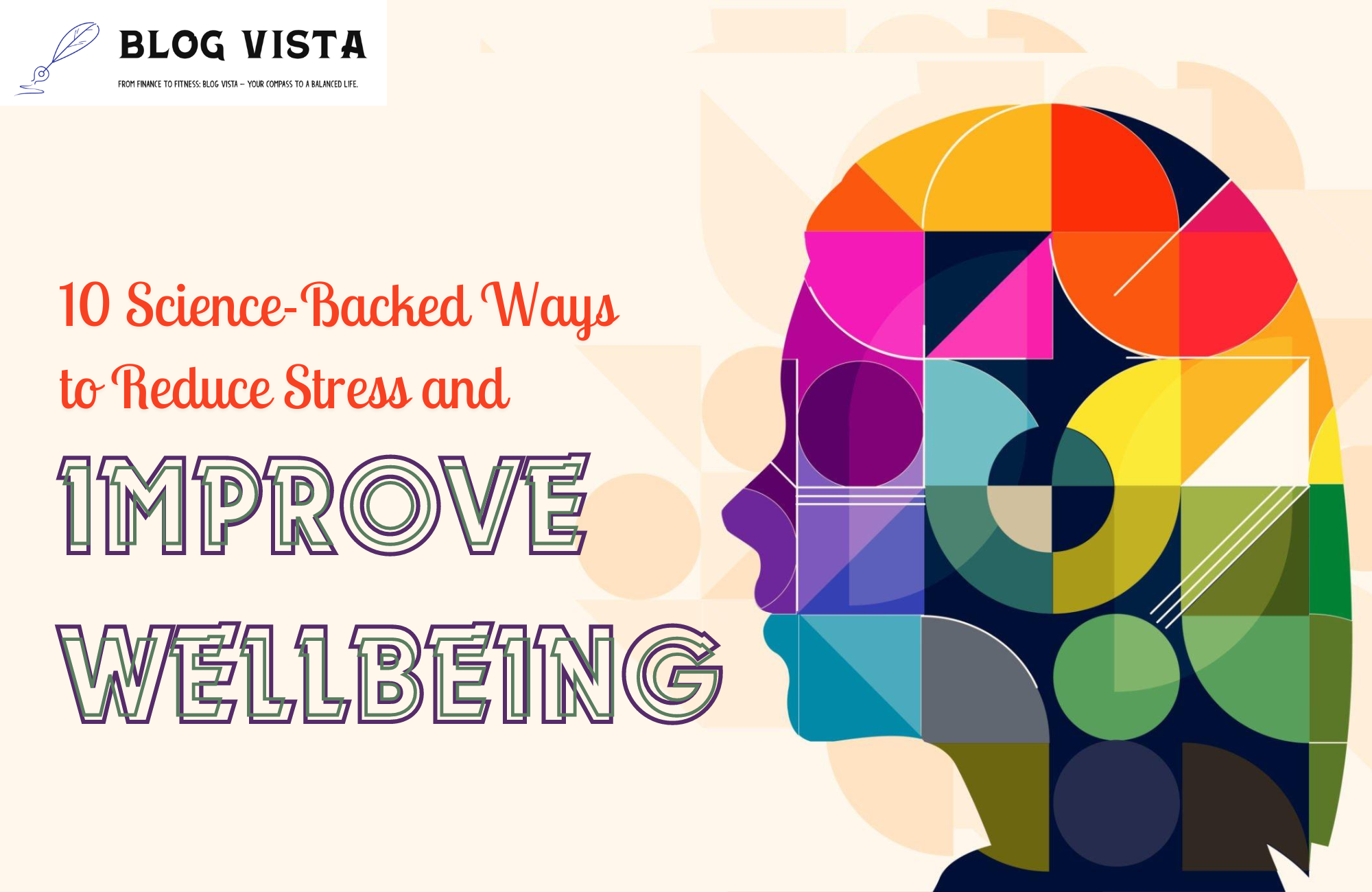Let’s be honest – with the constant demands and pressures of modern life, many of us struggle with high stress levels. I’ve certainly had my fair share of anxiety and burnout over the years. The good news is, there are proven ways to regulate the body’s stress response and boost overall wellbeing. I’ve discovered that making self-care and stress management a regular habit is key for staying happy and healthy amidst the craziness of everyday life.
In this blog, I’ll share 10 science-backed tips that have worked wonders for lowering my stress and improving my mental and physical health. Implementing even a few of these strategies can make a big difference!
1. Breathe Deeply
Deep, diaphragmatic breathing triggers your relaxation response by stimulating the vagus nerve and lowering cortisol and adrenaline. Just taking 5-10 minutes a day to focus on slow, deep breaths can induce calmness. One effective breathing exercise is belly breathing – place one hand on your chest and the other on your stomach. Inhale slowly through your nose and feel your stomach expand. Exhale slowly through pursed lips. Repeat for 5-10 minutes. Apps like Breathwrk guide you through therapeutic breathing exercises.
2. Practice Mindfulness Meditation

Mindfulness meditation involves paying attention to the present moment in a non-judgmental way. Studies show it can improve your wellbeing by decreasing anxiety, depression and pain by reducing activity in the brain’s default mode network. Start with 5 minutes per day using a mindfulness app like Headspace. Focus on your breath while acknowledging and letting go of distracting thoughts. The more you practice, the easier it gets to find that sense of clarity and calm.
3. Exercise Smart
Exercise releases feel-good endorphins and hormones that boost mood naturally. Aim for 30 minutes per day of moderate activity like brisk walking, swimming or cycling. Interval training combines short bursts of intense activity with recovery periods to torch calories and relieve stress. Outdoors activities like hiking or kayaking immerse you in nature for added benefits. Just be mindful not to overdo high-intensity exercise, which can increase cortisol.
4. Get Your Zzz's

Chronic sleep deprivation disrupts hormones like melatonin and cortisol that regulate stress response. To improve your wellbeing, stick to a regular sleep-wake schedule and aim for 7-9 hours per night. Limit light exposure and stimulants before bedtime. Create an optimal sleep environment – cool, dark and quiet. If you struggle with insomnia, consider cognitive behavioral therapy techniques to improve sleep habits. Proper rest leaves you happier and better equipped to manage daily stressors.
5. Eat a Balanced Diet
What you eat impacts your body’s wellbeing and ability to respond to and recover from stress. Minimize inflammation through a diet rich in colorful fruits/veggies, whole grains, lean protein and healthy fats. Stay hydrated with water instead of sugary drinks. Limit caffeine to avoid intensifying the stress response. Keep blood sugar stable by consuming fiber, protein and complex carbs at meals. Managing stress through healthy eating gives your body and mind the nourishment it needs to thrive.
6. Stay Socially Connected

Relationships can provide valuable emotional support and buffer against the impacts of stress. Make regular social interaction a priority, even if you don’t feel like it. Schedule video chats to catch up with long distance friends. Attend virtual events to meet new people who share your interests. Spending face-to-face time (responsibly) engaging in fun activities can satisfy your social needs and boost mood.
7. Set Healthy Boundaries
Saying no to non-essential tasks and delegating when possible prevents you from feeling stretched too thin. Communicate openly about workloads or financial strains so reasonable accommodations can be made. Limit exposure to toxic relationships that drain you emotionally. Prioritize self-care without guilt or apologies. Stress is inevitable but enforcing healthy boundaries gives you the energy to cope effectively.
8. Find Meaning and Purpose

Get in touch with what makes life meaningful by clarifying your core values. Volunteering, creative hobbies and community engagement can give you a sense of purpose. Express gratitude regularly to cultivate optimism and shift perspective from stressors to blessings. Taking steps each day guided by your values provides the meaning and motivation needed to power through challenges.
9. Practice Gratitude
Taking time to actively appreciate positive things and experiences can rewire your brain to focus less on sources of stress. Try keeping a gratitude journal where you jot down a few things you’re grateful for each day. Express thanks and appreciation to others. Savor fulfilling experiences like a beautiful sunset or quality time with loved ones. Developing a gratitude practice helps inoculate your brain against anxiety and despair.
10. Reframe Negative Thoughts

How you perceive and react to stressors has a big impact on your mental health. Instead of spiraling into catastrophic thinking when faced with negative situations, try reframing your thoughts in a more optimistic light. Ask yourself “what is the best thing that could happen?” or “how might I grow from this?” Maintaining perspective and hope in the face of adversity builds resilience and emotional stamina.
Conclusion - Cultivating Wellbeing Through Science
In today’s fast-paced world, it’s all too easy to get caught up in the rush and stresses of everyday life. But taking time for self-care is crucial for maintaining balance and peace of mind. The strategies covered in this article – from deep breathing to exercise, healthy eating to social connection – offer research-backed methods to help you lower anxiety, improve sleep quality, boost mood and build resilience will definitely improve your wellbeing.
By regularly implementing even a few of these science-supported stress management techniques, you can create a healthy lifestyle for yourself and train your body and mind to respond to challenges in more positive way.
Frequently Asked Questions
Managing stress is crucial for overall wellbeing because chronic stress can negatively impact mental and physical health. Learning stress management techniques helps regulate the body's stress response, reducing anxiety, depression, inflammation and more.
Experts recommend aiming for 30 minutes per day of moderate intensity aerobic exercise to relieve stress. Activities like brisk walking, swimming, cycling or light jogging can stimulate mood-boosting endorphins and hormones.
Deep breathing stimulates the vagus nerve which activates the body’s relaxation response, lowering blood pressure, heart rate and stress hormones like cortisol.
Mindfulness meditation involves non-judgemental attention to the present moment. Research shows it reduces activity in the brain's default mode network linked to anxiety, depression and pain.
Sleep is when the body repairs itself and restores hormones like melatonin and cortisol that regulate stress response. Chronic sleep deprivation disrupts this process. Aim for 7-9 hours per night by sticking to consistent sleep and wake times and proper sleep hygiene habits.
Eat a balanced diet with anti-inflammatory foods like fruits, vegetables, whole grains, lean protein and healthy fats.
Relationships can provide emotional support and belonging which counteract negative impacts of stress like anxiety, isolation and depression.
When faced with a negative event, try reframing catastrophic thoughts in a more optimistic light. Ask “what is the opportunity for growth?” or “how can I learn from this?” Maintaining perspective by focusing on the positive helps build resilience.


2 thoughts on “10 Science-Backed Ways to Reduce Stress and Improve Your Wellbeing”